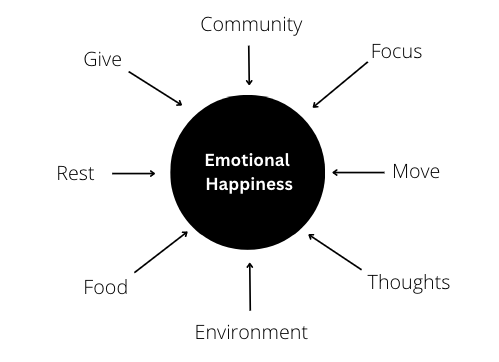How to Make Your 2023 Happier.
3 minute read
Do you ever feel like you’re in this never-ending pursuit of happiness? I do. But if there’s one thing 41 years on this planet has taught me, it’s that chasing happy is futile, it’s one of many experiences we all jump in and out of, and we all experience this gap or longing beyond what we find here. On that front, I’m learning that it’s not about becoming happy, but happier. I say this fully recognising other essential ingredients to a rich life; purpose in life, allowing resilience to shape us and accepting life’s ups and downs to name a few.
When it comes to creating happier emotions, there’s a section of the brain which, for simplicity, let’s call the emotional brain (limbic system). In very simple terms, it sits under our ‘thinking’ brain and above our ‘survival’ brain, as depicted below. Here we can find answers into experiencing more ups and less downs.
The Emotional Brain - Limbic System
The limbic system has a few different roles, one of those being emotional regulation. It’s the part of the brain responsible for our feelings and mood. If stimulated in the wrong way, it can lead to negative emotions, if stimulated in the right way, it can lead to feeling better… feeling happier.
8 Ways to Stimulate More Happiness
In his book ‘Live More Happy’, Dr Darren Morton outlines a range of ways we can stimulate our emotional brain in order to create positive emotions. Here’s a summary:
Thoughts: Speak positively to yourself. Keep internal dialogue positive & uplifiing. Silence the inner critic. Become a self-advocate for yourself.
Focus: Feelings follow your focus. Your thoughts influence your emotional brain, steer them in a direction that keeps your thinking uplifting. Create daily habits of gratitude. Look out for the good stuff in life.
Move: Motion creates emotion. Ahh this one is often a hard one! Keep exercise simple & attainable. Mix it up. Do it with others. Where possible create a sense of play while moving.
Environment: Blue & Green should often be seen. Immerse yourself in an uplifting environment. If you’re out under the sky, near water or amongst greenery, you’re investing in your emotional brain.
Food: Food feeds your mood. This one is a minefield as there are so many conflicting opinions about diet. Take notice. Find what works. Kick bad habits. Create good ones. Sustain them. Notice your mood.
Rest: Rest to feel your best. Western Culture isn’t always so good at this one. Create routine. Avoid things that keep you awake in the evening. Relax. Be mindful of what’s around you. Find your pause button in life.
Community: Together feels better. We need to connect to feel emotionally healthy. Relationships magnify emotions. Maintain current relationships, create new ones. Hang out with positive people.
Give: Giving is living. Some of our greatest highs come from sharing our greatest gifts. Know your gifts. Share your gifts. Focus outwardly. Look beyond you.
How to Create More Happiness… Simply
That’s a bit of work right! It does involves rolling up your sleeves and being intentional, but if you create some strong habits and package them in a way where you double them up, I think the return is well and truly worth it.
Here’s some examples I’ve played around with:
Go for a run (move) in nature (uplifting environment) with mates (community)
Eat a healthy meal (food) with friends and family (community) by the beach (environment)
Laze in a hammock or beanbag (rest) focusing on what your grateful for (focus/thoughts)
Volunteer at a local charity (give) with a family member (community) and think about the positive impact if the work (thoughts)
Give some of these things a crack. And measure their impact, being mindful the benefit is often delayed. The simplest way I do this is by a rating my mood out of ten - 10 feeling rubbishy for whatever reason, 0 feeling good about life. I rate myself before I try one or more of the strategies above, then rate it again afterwards. It’s a super simple way to validate the effect it has, as invariably the change doesn’t kick in instantly, it’s a slower burn throughout the activity, or in cases like food, maybe even days that follow.
I would love to know whether this article was helpful - anonymously click the button below if it was.
Happy 2023 :)
Reference: Dr Darren Morton, ‘Live More Happy’, 2018.



